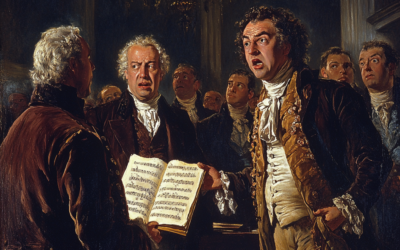Leopold Mozart
The Myth of Mozart: A Closer Look at the Man Behind the Legend
A critical examination of Wolfgang Amadeus Mozart’s life reveals a man shaped more by his father’s ambitions than by innate genius. Stripped of the myths, Mozart’s early years reflect a childhood dominated by relentless touring, inconsistent education, and a legacy built on exaggerated achievements. Discover the real story behind the legend.
“It wasn’t like that, because Leopold chose to rush his children’s development, making them perform immediately as circus attractions, dragged from place to place, even at the risk of their lives, just to astonish an audience that was generally incompetent and merely seeking entertainment”
Mozart in Italy
Wolfgang Amadeus Mozart is often celebrated as a musical prodigy and a genius whose talents were unparalleled. However, the reality of his life, as revealed through a more critical examination, suggests a different story. Born into a family where his father, Leopold, had grand ambitions, Mozart’s early years were shaped more by his father’s aspirations than by his own natural genius.
From the moment Wolfgang was born, Leopold saw in him an opportunity to fulfil his own dreams of fame and recognition. Leopold’s goal was not just to nurture his son’s musical talents but to create a spectacle that could be paraded across Europe, showcasing Wolfgang and his sister Nannerl as prodigies. The family’s relentless touring and performances were not so much about artistic growth as they were about satisfying Leopold’s desires for status and success.
Contrary to popular belief, Wolfgang’s early musical education was far from comprehensive. While he was encouraged to improvise and perform, his formal training was inconsistent, and much of what is attributed to his early compositions may have been heavily influenced or even entirely crafted by his father. The legendary “compositional notebooks” purportedly filled with young Wolfgang’s works were, in fact, mostly exercises and simple pieces, many of which were written or arranged by Leopold himself.
Leopold’s ambition extended to the fabrication of documents and stories that exaggerated Wolfgang’s early achievements. The so-called “composition book” gifted to Wolfgang for his seventh name day was later revealed to be a fraud, created long after the fact to embellish the narrative of Mozart’s childhood brilliance. These myths were further propagated by early biographers who relied heavily on Leopold’s embellished accounts, rather than on verifiable facts.
The truth is that Wolfgang was a talented child, but he was also a product of his father’s relentless ambition. Instead of allowing him to develop naturally, Leopold thrust Wolfgang into the limelight, often at the expense of his education and well-being. This aggressive pursuit of fame created a legend, but it also obscured the reality of who Mozart truly was.
You May Also Like
When the Myth Collapsed
Vienna exposed the myth: La Finta semplice was riddled with errors, and Wolfgang’s supposed opera genius was nothing more than Leopold’s fabrication. With their reputation in ruins, father and son turned to Italy, hoping to rewrite history.
The London Notebook and the Vienna Disaster
Far from the myth of a flawless young genius, Mozart’s London Notebook reveals musical struggles and guided exercises, while the Vienna opera disaster proved that his father played a far greater role in his compositions than legend would have us believe.
Versailles, Vanity, and the Pursuit of Prestige
Leopold Mozart’s letters transformed his son’s European tour into a carefully staged fantasy—filled with exaggerated encounters, fabricated royal admiration, and a relentless pursuit of social prestige. But how much of it was real?
The Fabricated Childhood of Mozart
The legend of young Mozart’s divine genius crumbles under scrutiny, revealing a childhood dictated by Leopold’s ambition, carefully constructed myths, and a relentless pursuit of fame at the expense of genuine artistic education.
The Man Behind the Myth
Leopold Mozart’s legacy has been shaped by myths and hagiographies, but his letters reveal a man more concerned with financial gain and self-promotion than artistic integrity. Was he truly a devoted father, or simply an opportunist?
Constanze vs. The Catholic Church
For over two centuries, scholars have debated the circumstances surrounding Mozart’s burial. Constanze Mozart’s supposed inability to mark his grave, the confrontation with the Catholic Church over funeral masses, and the baffling disappearance of Mozart’s body all contribute to a mystery stranger than fiction. Did a powerful group keep her silent? And what really happened to Mozart’s remains?







